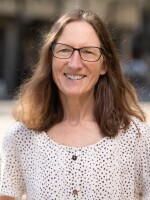While the focus of recent U.S. immigration debate is lately Latino or Muslim countries, migrants from other places are also paying attention. KLCC's Karen Richards spoke to several people in the Eugene area from non-targeted countries and has this report.
At her cozy home studio in Eugene, Melissa, or Mimi, Nolledo often fills her weekends with photo shoots. She started photographing immigrants and compiling their stories about 18 months ago, in an effort to challenge stereotypes:
Nolledo: “It was actually a reaction to the elections. People, they have that deep sense of, okay, 'I don't think I really fit in here' and now all of a sudden the spotlight is on us as immigrants, and I think this has given people an opportunity also to talk about that.”

She's displayed her “Immigrants of America” series all over Oregon. What comes through is the diversity of experiences and the universal themes. Nolledo came from the Philippines in the late 1980s.
Nolledo: “I've never really been conscious about these challenges that most immigrants, who come from, say, Mexico face.”
Cultural opinion of various immigrant groups changes over time. I meet Ruby McConnell at a coffee shop. Her father, a priest, moved here from Ireland:
McConnell: “When he came to Eugene in fact his own parishioners spit on him because Irish Catholics were considered lower than dogs.”
Although McConnell doesn't feel targeted now, she felt out of place growing up. She remembers one incident when the father of someone she babysat complained about immigrants on a ride home.

McConnell: “And you sit in the car and you go 'I am white, so he does not believe that it is possible that I could be the person that he's talking about.' And what do I do in this moment knowing that what he's really doing is revealing his racism to me.”
Ela Kubok is here on a green card from Poland. She hasn't felt endangered by U.S. policies, but she wants people to know she's an immigrant:
Kubok: “There was a lot of negative attention to certain countries,
and I wanted to show that America has all different types of immigrants. I too do not have a U.S. passport, I cannot vote in an election, but I'm physically here. I work here, I pay taxes, I'm a productive member of this community.”
Because her marriage is new, Kubok's green card was only valid for two years, and it's expired. Coming home from Europe recently, she was detained in Chicago because of the unusual green card extension. She took the delay in stride:
Kubok: “I think about the people who don't speak English the same way that I do and how intimidating that can be for them.”
She made it home without missing her connection, partially with the help of another Polish immigrant who worked in customs.
Ruby McConnell says she strives to be an advocate for immigrants but, being European, it's not easy:
McConnell: “The otherness of not really feeling like you can reach out to other groups of immigrants because you're somehow less authentically an immigrant, because you're white and you've walked into some degree of privilege.”
McConnell feels she speaks for both sides in some ways, but in some ways for neither. It makes her want to be more vocal.
Thomas Kreuzpeintner remains on a green card from Germany, although he's lived in Eugene 20 years.
Kreuzpeintner: “I probably could have became an American citizen for a long time if I chose so. I just have a hard time with the German bureaucracy.”
He's pursued dual citizenship, but says Germany has tough criteria. The country has admitted many refugees, including over a million in 2015, but it's stingy with granting nationality. Though it's now a political hot point, Germany is still seen as a welcoming place.
Kreuzpeintner: “I see it in Germany I see it in Europe, there's a lot of things that they do that are a lot better than here, that make it better for all the people and here it becomes more and more of a 'have and have not' situation.”

Some see promise in the recent attention to immigration. Ela Kubok thinks U.S. policy reform is essential.
Kubok: “I think a crisis ... it's a great opportunity to use innovation to fix the problem. I think it brings people together at least talking about this all the time, people are more aware.”
She says the United States has global power, and policymakers need to consider the international context.
Mimi Nolledo's photo essays have made her hopeful:
Nolledo: “This awareness is growing, … and yes it does empower us. It's actually a beautiful thing. I'm really hoping that these small ripples, these stories, these things that happen around us, they're all going to culminate in a change, because we need that change.”
Nolledo's project is on display at Oregon State University's Asian and Pacific Cultural Center the evening of April 12th and at the Environmental Justice Showcase in Eugene's Kesey Square April 20th.
Funding for KLCC's "Borders, Migration, and Belonging" series is provided by the Wayne Morse Center for Law and Politics at the University of Oregon.





